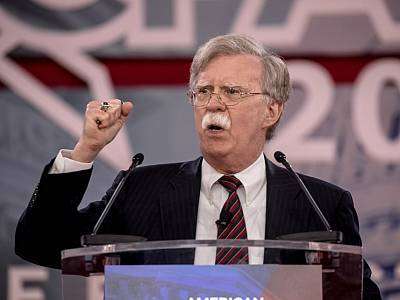The Volokh Conspiracy
Mostly law professors | Sometimes contrarian | Often libertarian | Always independent
If Congress Reclaims Its War Powers, There Would Be Little Reason to Worry About John Bolton
Many people fear that John Bolton and Donald Trump might start an unnecessary war. But such fears would be unnecessary if Congress were to reclaims it power to initiate war.

Commentators as varied as George Will and the New York Times editorial page have expressed great alarm about President Trump's appointment of John Bolton as his new national security adviser. The reasons are understandable: they fear that the almost cartoonishly hawkish Bolton might influence an already bellicose and impulsive Trump into starting an ill-advised war against Iran, North Korea, or elsewhere. While the national security adviser has little formal authority in his own right, he could potentially exercise great influence over a president; especially one who - like Trump - has little knowledge of world affairs, and whose impulses might align with Bolton's.
There would be far less need for such alarm if Congress would act to reassert its control over the power to initiate war. The Founding Fathers gave Congress that authority precisely to preclude a situation where a single person had the power to take the nation into war. Although they could not foresee the exact circumstance of Trump's rise, they did worry about the possibility that the presidency might be held by a man who is impulsive, a dangerous demagogue, or a politician with an interest in starting a war that benefits him politically at the expense of the national interest. For that very reason, they denied the president the power to start a war, and instead gave it to Congress.
As James Madison put it, "[t]he constitution supposes, what the History of all Gove[rmen]ts demonstrates, that the Ex[ecutive] is the branch of power most interested in war, & most prone to it. It has accordingly with studied care, vested the question of war in the Legisl[ature]." Even Alexander Hamilton, the leading advocate of expansive presidential power among the Founders, wrote that only "the Legislature have a right to make war" and that "it is . . . the duty of the Executive to preserve Peace till war is declared."
In recent years, unfortunately, congressional authority in this field has been eroded, including under President Obama, who started two wars without congressional authorization - the 2011 Libya intervention, and the war against ISIS. There are a variety of steps Congress could take to reassert legislative control. I discussed some of them here. Others have been suggested by Yale Law School Professor Bruce Ackerman, one of the few constitutional scholars who has consistently raised this issue under both Obama and Trump and took both to task over it.
If Congress retakes control over the initiation of war, that greatly reduces the potential harm that can be caused by either Bolton or any other presidential adviser. Even if he persuades Trump, the US will not initiate a war unless he also persuades both houses of Congress, which requires a fairly broad political consensus. Bolton could still perhaps exercise harmful influence on policies that fall short of war. But he and Trump would not be able to start a major conflict on their own.
While the combination of Bolton's uber-hawkishness and Trump's impulsive ignorance about the world is particularly problematic, the issue here goes beyond any one president or any one adviser. Trump is far from the first man to arrive in the Oval Office with little or no foreign policy experience and very limited knowledge of international relations. His three immediate predecessors - Bill Clinton, George W. Bush, and Barack Obama - all also had little foreign policy background when they were elected. Obama himself has admitted that his intervention in Libya was his "worst mistake," though he still refuses to see how initiating the war without constitutionally required authorization exacerbated the error and made the outcome worse than might otherwise have been the case.
Likewise, Trump may not be the last impulsive demagogue to get in the White House. His exploitation of public ignorance was just an extreme example of a common political strategy. We should not rule out the possibility that others with similar flaws will successfully follow in his footsteps. And even a more conventional politician cannot be safely trusted with the power to initiate war at will.
John Bolton isn't all bad. There is, for example, much to be said for his negative view of the United Nations, and for his longstanding insistence - in sharp contrast with Trump - that the US should take a stronger line against Vladimir Putin. Still, there is good reason to worry about the ways in which his worst instincts might interact with Trump's. That combination would be far less problematic if Congress reasserts its war powers, and makes clear that the Constitution does not give any one person the power to start a war.


Show Comments (94)